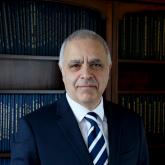- Academics
Civil Engineering, Ph.D.

Growing and established cities are continually meeting new infrastructure needs and maintaining older systems, such as highways, bridges, and airports. The School of Engineering's Ph.D. in Civil Engineering program produces graduates dedicated to enriching the field. Research-oriented and focused on the latest developments in the discipline, our program readies you for civil engineering research careers in the private sector. It also prepares you to teach at the university level, ensuring the most recent advancements in the field are shared with a new generation of civil engineers.
Concentrations
As a Ph.D. candidate, you will choose to concentrate in 1 of these sub-disciplines:
- structural materials and engineering
- geotechnical and geo-environmental engineering
- environmental and water resources engineering
- construction management and engineering
- highway and traffic engineering
- urban infrastructure systems
Other focus areas are possible and can be developed with the assistance of faculty advisers. All subject areas must be relevant to the degree sought, and a faculty member must be willing and able to guide your research.

Abu Dhabi Global Fellow Program

Urban Science Doctoral Track
Admissions
Admission Requirements
- Admission to this program requires an MS in Civil Engineering or equivalent with a GPA of 3.5 or better (on a 0-4 scale).
- Foreign applicants must take the TOEFL examination and submit the results for consideration.
In criteria 1 and 2 above, the “equivalent" can be achieved in several ways. You may have an MS degree with a different title that covers substantially the same material. In more general terms, you must demonstrate that you have the equivalent of all undergraduate and masters-level coursework to be able to pursue doctoral-level work in the chosen major area, as well as in a minor area within the umbrella of civil engineering. Further, “equivalence” is evaluated based on the totality of your undergraduate and graduate record, not course-by-course. Thus, if you wish to pursue doctoral work in Environmental Engineering, for example, you must have the entire undergraduate and masters-level course background expected in Environmental Engineering, but you do not need to demonstrate such a background in structures.
Because admission to a Ph.D. program requires a relevant MS (or equivalent), applicants who have not yet achieved a master’s degree would normally be admitted as MS students. They are expected to earn an MS degree while completing their major and minor course requirements. In rare cases, an applicant with only a BS degree may be directly admitted into the Ph.D. program with the written approval of the department head.
Find out more about Admission Requirements.
Transfer Credits
Ph.D. students are required to submit transcripts along with the syllabi for any courses they wish to transfer. Only courses with 3 or more credits are eligible for transfer. Please refer to the transcript credit request form.
A maximum of 48 credits of approved graduate work may be transferred and applied to your degree requirements. They would be awarded on a course-by-course basis or by the transfer of an MS degree from another institution in satisfaction of 30 graduate credits. The latter requires a recommendation from the department’s Graduate Committee and the approval of the department head. Transfer credits must be approved by the academic adviser, the graduate coordinator, and the department head.
Curriculum
Every Ph.D. student upon admission is assigned an academic adviser, who is designated by the department head. Any member of the civil engineering faculty may be an academic adviser to a Ph.D. student. The first meeting should take place shortly after receiving an acceptance letter from the Admissions Office. During this first meeting the student’s Program of Study should be established. The Program of Study should include a list of the fundamental and advanced topics that will comprise the specific courses, the subject matter for the qualifying exam and possible research areas.
Committees
Qualifying Exam Committee (also known as the Academic Advisory Committee): The qualifying examination is a pass/fail milestone in the Ph.D. process. Every student pursuing a Ph.D. must pass a qualifying examination before becoming a candidate for the Ph.D. According to NYU Tandon School of Engineering policy, students should take the qualifying exam within their first year of study at NYU Tandon School of Engineering. The Academic Advisory Committee generally consists of the academic adviser and one faculty member for a minor area of study. The Academic Advisory Committee guides the PhD student’s work through the successful completion of a qualifying examination. A letter signed by the academic adviser and approved by the department head is placed in the student’s file indicating the composition of the Academic Advisory Committee Form.
Guidance Committee (also known as Dissertation Guidance Committee): Within six months of passing the qualifying examination(s), students and their dissertation adviser must form a guidance committee that will oversee course selection, provide research guidance, and ensure that satisfactory progress is being made toward completion of the dissertation in a timely manner. Course selection must ensure that requirements of major and minors set forth by the respective programs are met. The committee, at its discretion or bound by departmental regulations, may require students to present a dissertation research proposal. The committee is expected to meet at least once per semester to assess student progress, and doctoral students must defend their dissertation in front of this committee. Doctoral students must obtain a checklist of the milestones and requirements for the Ph.D. program from the Office of Graduate Academics. The Guidance (Dissertation) Committee shall have no less than five members, including a chairperson, a major adviser, and an adviser for each minor the student is pursuing, one of whom must be on the faculty in another NYU Tandon School of Engineering department. One external member who is either a faculty member at another academic institution or a noted PhD-level practitioner is encouraged. Additional faculty members may also serve on the Guidance Committee. Upon permission of the program director, four advisers will be allowed.
Dissertation Defense Committee: This committee is formed when the student is ready to defend their proposal. The defense is organized and scheduled by the Guidance (Dissertation) Committee. All Institute faculty members may observe and ask questions at all NYU Tandon School of Engineering dissertation defenses. Therefore, the date of the defense must be announced Institute-wide at least one month before the event, and copies of the draft dissertation must be available to any faculty member who requests one in a timely fashion and in no case less than two weeks before the defense.
Qualifying Examinations and Dissertation
Before becoming a candidate for the Ph.D., you must pass a qualifying examination.
Immediately after you pass your qualifying exam, a Dissertation Committee will be formed. This panel of experts will guide your course of study and research work. You are required to submit and present a dissertation proposal. The culmination of your Ph.D. work will be the defense of the final draft of your dissertation. There are important requirements involved in the qualifying examination and dissertation processes. One of these requirements is that your defense of the final draft of your dissertation must take place in-person at the designated campus.
View the yearly Progress Report Form.
Note: This form must be completed by each student every semester (after passing the Qualifying Exam).
Career Outcomes
The Ph.D. in Civil Engineering program prepares students for research-focused careers in a wide variety of job sectors, including industry, consulting firms, and municipal, state, and federal government agencies as well as academia.
Since the 1990s, NYU’s Wasserman Center has conducted the Life Beyond the Square survey to track NYU graduates’ career trajectories. Visit the Tandon Graduate Employment Dashboard and select “Doctorate” and “Tandon School of Engineering” for insights on recent alumni outcomes.




